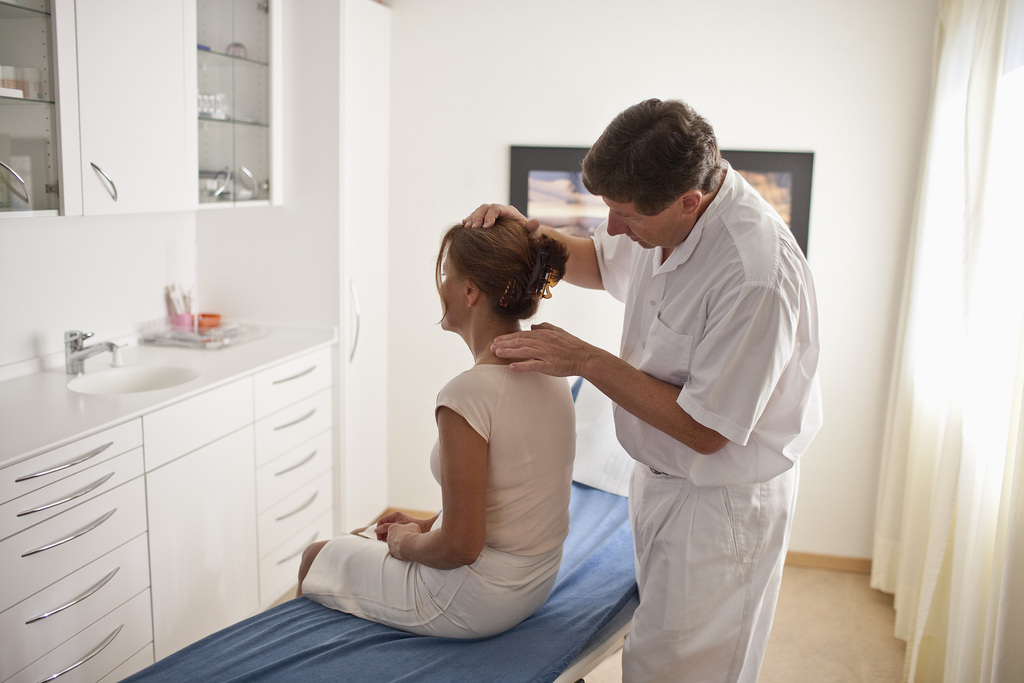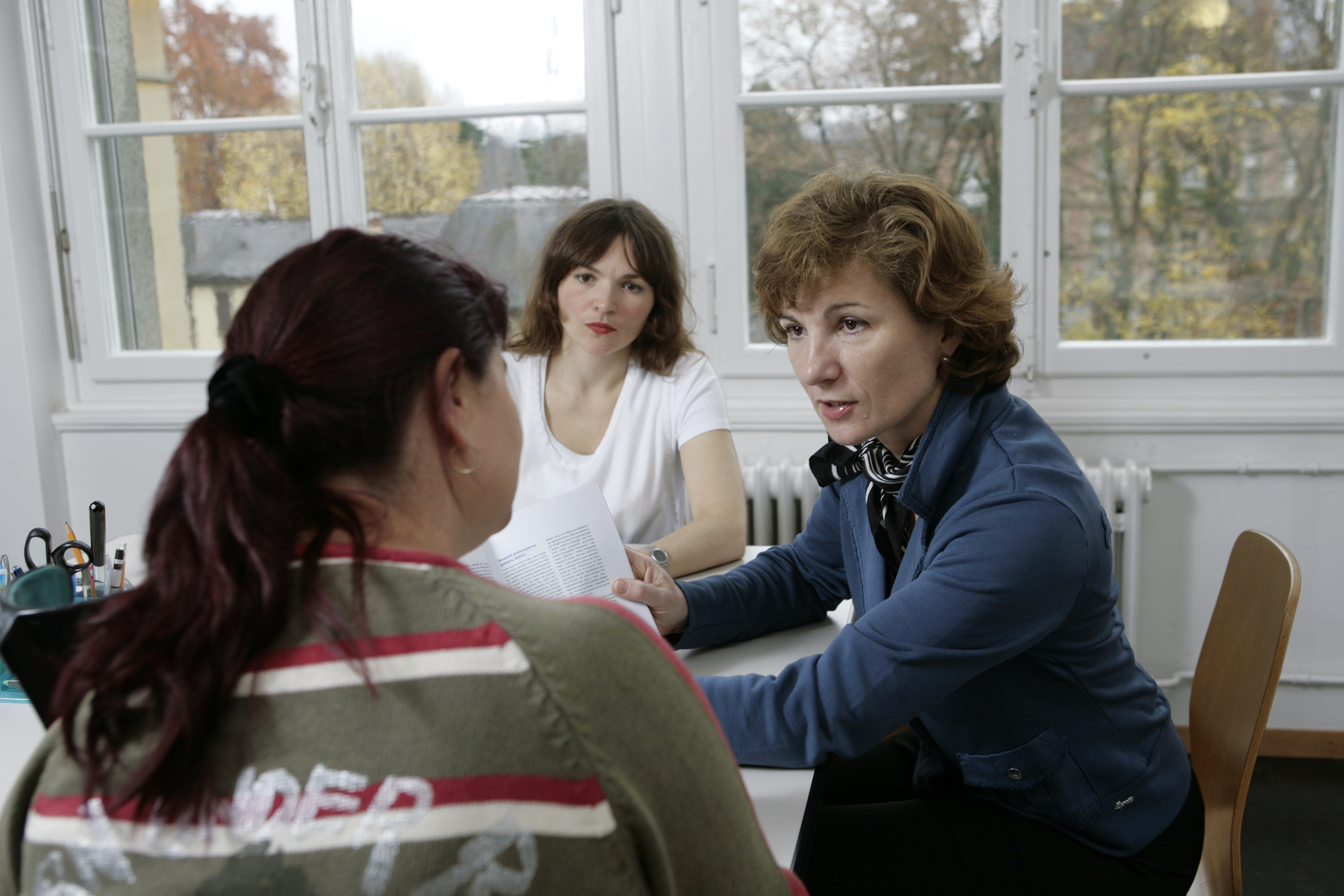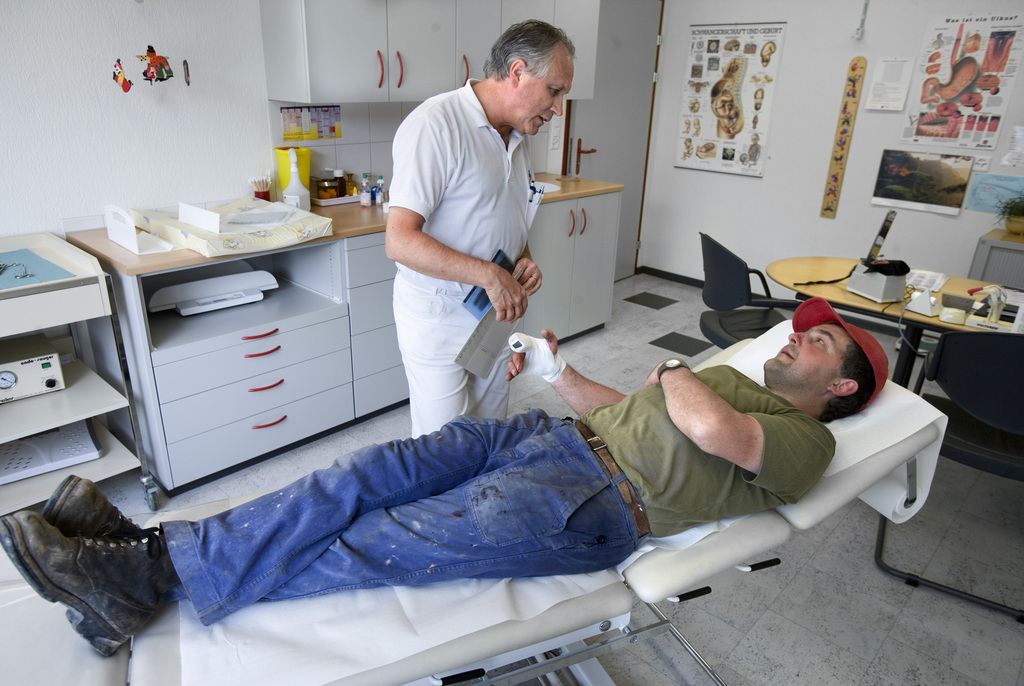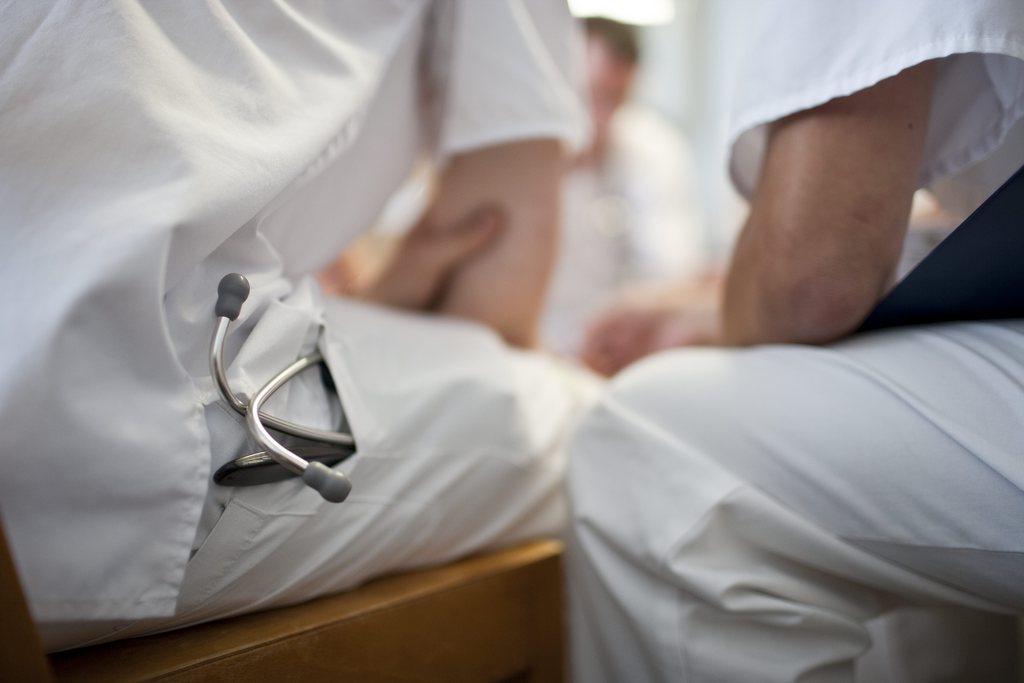Community doctors hope for a shot in the arm

Voters are set to decide on May 18 whether to boost the role of family doctors in the Swiss health system. The constitutional amendment is one of several measures to deal with an aging population and to re-distribute doctors across the country.
General practitioners have lobbied hard to get the government and parliament to draw up a legal reform, as well as a series of measures to boost the role of community doctors, the cornerstone of primary healthcare.
The issue has been bubbling for a number of years. From 2006 GPs began calling for new measures to make their profession more attractive. As the Swiss population slowly gets older and the number of people suffering from chronic illnesses increases, the number of practitioners continues to fall.
The added problem is that there are not enough replacements. Only 10% of medical students choose to become GPs. Experienced practitioners say this is due to current health policy that undermines their work, especially the salary system that penalises them compared with other medical specialties.
In recent years Swiss doctors have even taken to the streets in protest – something unusual in Switzerland. But as their views were not properly heard, they decided to launch a people’s initiative in 2009 under the slogan, “Yes to community medicine”. Their text called on the federal authorities and cantons to promote their profession, guarantee everyone equal access across the country and improve university and professional training.
The initiative broke all records: in less than six months over 200,000 signatures – twice the required number – were collected.
The government and parliament acknowledged the concerns of the campaigners but said it was problematic to focus just on GPs. They therefore put forward a counter proposal, which is the text to be voted on May 18, which nevertheless appears to have the backing of many of those concerned. The supporters of the initiative have even withdrawn their text as they are satisfied with the new offer.
The change in the medical landscape in Switzerland has different causes. The most important is the insufficient number of Swiss medical school graduates, which is too low to offset the generational change.
With 9.4 medical school graduates per 100,000 inhabitants, Switzerland is below the OECD countries’ average of 9.9. All of their neighbouring countries, with the exception of France, have outstripped them.
The statistics are even worse when taking into account that the numbers of new doctors is too low to replace retiring doctors, especially as many younger doctors prefer part-time work. This is particularly pronounced in the case of women, who since 2000 have made up the majority of medical students and whose proportion of the doctors’ ranks continues to rise.
According to Swiss Medical Association statistics, in 2012 there were around 32,000 doctors. Women made up 37.5% of all doctors in Switzerland. In the under-34 age group, they constitute a majority.
Further grounds for the increase in specialists and decrease in other areas are the high salaries, more regular hours, and greater prestige of specialists. There is an acute shortage of general practitioners in particular.
‘Integrated healthcare concept’
“This constitutional amendment is better than the one proposed by the initiative,” says centre-left Social Democrat parliamentarian Marina Carobbio Guscetti, who is also a family physician.
“It foresees the strengthening of all basic healthcare in order to improve the treatment of all health problems as well as public access to healthcare,” she continues.
“The text underlines the importance of community healthcare but includes all basic health professions. In this way we are proposing an integrated healthcare concept which includes GPs but also nurses, physiotherapists, ergo therapists and others.”
Carobbio believes that in the future basic healthcare should be built on cooperation and complementarity between medical professions: “In order for chronic illnesses to be properly attended to you need a global approach.” She added that if the vote passes, it will give GPs a “major boost”.
Opposition
“The counter-proposal is definitely not as bad as the initiative. But there is a big problem, as it guarantees in the constitution a salary for a specific profession. That has never been done before. And what does ‘appropriate salary for community medicine services’ mean?” asks Guy Parmelin, a parliamentarian from the rightwing Swiss People’s Party, who, like most of his party members, opposes the text which otherwise has widespread support.
“We agree that basic healthcare services should be better distributed across the country and accessible to all and that we need to better support community medicine. But not with this constitutional amendment,” says Parmelin.
He adds that there was a risk of the transferal of competences from the cantons to the federal authorities: “It’s up to the cantons and the communes to be more active, as they know the needs best. It’s that proximity which ensures efficiency and not centralisation,” says Parmelin.
The amendment clearly states that the federal authorities and cantons should act according to their specific competences, replies Carobbio. She says the text is “a strong signal and will allow definite projects to be undertaken”.
Besides the vote on the constitutional amendment to boost the role of family doctors in the country’s health system, voters will also have their say on the purchase of Gripen fighter jets and two other issues on May 18.
An initiative by the trade union federation is aimed at introducing a nationwide minimum salary while a separate group of campaigners wants to ban for life convicted paedophile criminals from working with children.
It is the second of up to four nationwide ballots this year.
At the same time, a series of votes and elections are scheduled at cantonal and local level on May 18.
Package of measures
On top of the legal changes, the federal authorities, cantons, GP associations and supporters of the initiative are planning other measures as part of their ‘community medicine and basic healthcare’ plan, which is backed by Interior Minister Alain Berset, to quickly find short and medium-term solutions.
A number of reforms are underway for training and research into basic healthcare and community medicine, as well as a revision of the law governing university medical professions.
The government also plans to allow GPs to raise their prices for laboratory tests carried out at their surgeries, which should generate CHF35 million ($40 million) a year. In addition, a general rise in tariffs for GP services is expected to bring in another CHF200 million.
This money would come from a reduction in the price of certain technical services offered by other specialists who, like the hospitals, are unhappy but do not oppose the legal amendment.
“All these reforms can be implemented without making changes to the constitution. The cantons have the possibility of giving financial support to allow GPs to set up in areas where there aren’t any or not enough,” insists Parmelin.
The People’s Party is likely to recommend voters reject the amendment. But it is not planning to campaign on this issue, as its priorities on the May 18 are the purchase of Gripen fighter jets and the rejection of a nationwide minimum salary.
(Translated by Simon Bradley)

In compliance with the JTI standards
More: SWI swissinfo.ch certified by the Journalism Trust Initiative















You can find an overview of ongoing debates with our journalists here . Please join us!
If you want to start a conversation about a topic raised in this article or want to report factual errors, email us at english@swissinfo.ch.